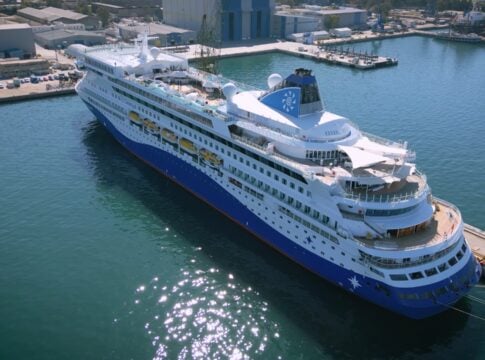Greece must proceed with the development of its own defense technology programs, which will contribute to the development of the country, Minister of National Defense, Nikos Dendias, said in an interview with “Naftemporiki”.
Therefore, investments in defense will not only not be characterized as “counterproductive” from an economic point of view, but will contribute to enhancing employment, supporting research and development, with technologies that will serve both military, social, commercial and civil protection purposes, he added.
The full interview with Michalis Psilos follows:
We live in a geographical area where there are three wars raging. What does this mean for Greece?
The three wars that are taking place in the wider region of our country prove in the most dramatic way that we are going through a period of great geopolitical uncertainty, during which things are changing rapidly. Greece must be prepared for all cases. It must have a strong presence on the international stage, protect what has been achieved in its foreign policy over the last four years and, relying on its Armed Forces, it must be a pillar of security and stability in its wider region.
Why has the reform of the armed forces become a matter of strategic importance lately?
The “Agenda 2030” is the biggest reform that has taken place in the Armed Forces, as Prime Minister Kyriakos Mitsotakis stated during the last meeting of the Council of Ministers. The rapid technological developments, cyber-attacks and Artificial Intelligence, as well as the recent armed conflicts in our region, highlight more than ever the need for the modernization and adaptation of the Armed Forces to the new situation. The main elements of the reform are the development of research and innovation, with the creation of the relevant ecosystem in the Armed Forces, and the modernization of the institutional framework of the Higher Military Educational Institutions.
The first step for the implementation of the ecosystem is the commitment of a part of the budget of the Armed Forces exclusively for the production of Greek defense products.
In order for this to happen, an independent body called the “Hellenic Innovation Development Center” is being created.
The independent body will manage programs and contracts, support the adoption of new technologies and facilitate cooperation with universities, military schools, research centers and businesses. It will also include the integration of Big Data and Artificial Intelligence (AI) for advanced real-time information processing.
The Greek frigate Hydra has already sailed into the Red Sea, while the Houthi attacks continue. Are you worried? And why is it there?
The frigate “Hydra” is indeed on a mission that involves danger. It would be hypocritical to hide it, although the frigate has the necessary means of self-protection and in cooperation with our partners and allies the necessary security measures have been taken. But “Hydra” is not there to serve the interests of other states, nor just to “display the flag.” It serves the national interests, as a unit of the Navy of a country with the largest merchant fleet on the planet, the safety of our sailors and the freedom of the supply routes of Greece, which affect the cost of living and the value of the country as a transit hub. After all, this is also an important reason why the administration of the ASPIDES Operation, with its headquarters based in Larissa, was entrusted to Greece. The mission of the frigate’s personnel in the Red Sea is therefore part of the National Military Strategy and the National Defense Policy.
Defense arm of the EU
You have said that Greece should play a central role in the security of the 27 EU member countries. In which areas and with what forces?
Today, it is more imperative than ever that the creation of a defense arm in the EU takes shape. We must not allow countries with revisionist and expansionist ambitions to implement their plans and take all necessary deterrent measures. Of course, this will be done in cooperation with our NATO allies. After all, the possibility that EU member states can defend themselves with their own forces, if the need arises, serves the strategic goals of the Alliance.
In this direction, Greece’s role can become extremely important. Not only because it is a country located on the external borders of the EU and has a significant Armed Forces, but also because we really believe in the need for a strong defense arm. Let me remind you that in addition to our country leading the establishment of Operation ASPIDES, the largest EU defense operation in history, it also took the initiative to create Operation IRINI, in the Mediterranean, in 2020, in which it has an active role and participates with a ship until today. Let me remind you that the EU Member States have signed the Helsinki Charter for a Common European Security and Defense Policy and have adopted the Strategic Compass for Security and Defense so that Europe plays an important role as a factor of deterrence, security and stability.
Also, in January 2023, with the third EU-NATO Joint Declaration, cooperation was extended to new areas, such as new technologies. But all this must be done, at a faster pace.
Greece and the EU’s new defense strategy
The European Commission announced its new defense strategy with co-financing of common arms purchases by the member states and the modernization of the sector’s factories. What is Greece’s participation in this strategy?
As the Ministry of National Defense, we were aware of these processes and the launched developments for the formulation of the new European Defense Industrial Strategy played an important role in the prioritization of our goals and the emphasis we placed on the creation of an Innovation Ecosystem for the Armed Forces. What is foreseen for a common market, in a significant proportion, of defense equipment, as well as the guarantees for half of European origin defense supplies, is a great opportunity not only for the formation of a common understanding about security, but also for our defense industry. Greece attaches particular importance to this strategy for the defense self-sufficiency of the EU and is committed to actively participate in any initiative aimed at the defense of European space.
Greece spends on defense much more than the 2% of GDP decided by NATO. Apparently because of the danger from the East. But how far will this arms race, which also deprives the country of productive investments in the economy, can go?
Greece is not in the same region as Luxembourg. Having a strong deterrent force is therefore a condition of national survival. This does not mean, on the other hand, that our spending will be reckless, as it will have to take into account budgetary margins.
“Every euro, a real need”
Our goal is that every euro that will be spent on defense corresponds to a real need that will be met in the best possible way. We have not closed the door on programs like the Corvettes, but priorities have changed. At the same time, however, with the implementation of the “Agenda 2030”, we aspire to stop relying on the purchase of weapons and move to the development of defense technology programs that have domestic added value. In this way, investments in defense will not only be considered “counterproductive” from an economic point of view, but will contribute to the development of our country and increase employment.
The country has two large shipyards – in Elefsis and in Skaramangas – which are under development. Will they be able to take on the construction of the new generation of US Constellation class frigates?
Greece has a specialized and experienced industry. I would like to point out that it is useful that our country has more than one large shipyard, such as the Skaramanga Shipyards and the Elefsis Shipyards, so that competition can work. Regarding the specific project, I believe that the shipyards of our country have the ability to respond to the above challenge.
Already, the US acceptance of the proposal to participate in the construction of new Constellation frigates is a great national success. This has a huge operational benefit, as our country, in combination with the acquisition of the 3 new FDIs, has the possibility to enter the next decade with newly built, in most of its fleet, ships. However, this program also provides a unique opportunity on a wider level. It will strengthen the national security and the economy of our country, through the integration of the Greek shipyards in the production and then in the repair process. Because we will be repairing not only ours, but also the US ships which will be in the wider area.
For reasons of national interest, we will ask during the negotiation process for the greatest possible involvement of the Greek defense industry in the construction of the frigates, in order to strengthen the skills and know-how of the sector, promote the development of new technologies and create specialized jobs.
Ukraine showed that in the new wars of the 21st century, drones and anti-drone systems will play an important role. Neighboring Turkey has advanced a lot in this area. What about Greece?
It is undeniable that the technological developments in the field of drones and anti-drone systems have changed the way of warfare on a global level. On my recent visit to Armenia, I learned extensively about their use on the modern battlefield. Let me remind you that this is a country whose Armed Forces were attacked by an Army that used drones on a massive scale, including Bayraktar drones. For the same reason, we will cooperate with Armenia, in the framework of bilateral defense cooperation agreements. Greece recognizes the importance of these technologies and is actively working to strengthen its capabilities in this area as well, within the framework of the new Ecosystem. We will work rapidly to cover this specific sector compared to our neighboring countries, as well as to create an anti-drone “dome” covering the Greek territory.














